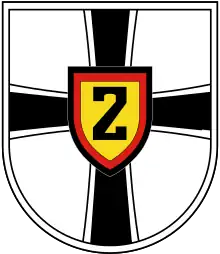| 2nd Flotilla | |
|---|---|
| Einsatzflottille 2 | |
 Coat of arms of Einsatzflottille 2 | |
| Founded | 27 June 2006 |
| Country | |
| Branch | |
| Part of | Navy Command (Germany) |
| Garrison/HQ | |
| Commanders | |
| Current commander | Flotilla admiral Axel Schulz |
Einsatzflottille 2 (EinsFltl 2 or EF 2) is one of the three brigade-level units of the German Navy, in addition to Einsatzflottille 1 and the Naval Air Command. It is based in Wilhelmshaven, Lower Saxony, and is subordinated to Navy Command, based in Rostock.[1]
History
Einsatzflottille 2 was set up on June 27, 2006, as part of a major reorganization of the fleet when the previous Zerstörerflotille (Destroyer Flotilla), which was founded on April 1, 1958, as Kommando der Zerstörer (Destroyer Command), was renamed. It mostly consists of the largest units of the fleet, namely frigates and supply ships, together with some smaller support vessels.[2]
Subordinate units
The staff of Einsatzflottille 2 are based at Marinestützpunkt Heppenser Groden, Wilhelmshaven. All of the frigates and some of the supply ships are stationed in Wilhelmshaven, others have their home ports on the Baltic Sea.
2nd Frigate Squadron
The first 2. Fregattengeschwader was created on October 1, 1988, succeeding the 2nd Escort Squadron (2. Geleitgeschwader) at the same base.[3] At first, the Bremen-class frigates F211 Köln and F212 Karlsruhe were transferred to the squadron with the 2nd batch, consisting of frigates F213 Augsburg and F214 Lübeck, following in 1989 and 1990 respectively.
The current unit was created on January 9, 2006, when the 1st (Sachsen-class frigates) and the 6th squadrons (Brandenburg-class frigates) were combined to form the new 2nd Frigate Squadron.[4]
4th Frigate Squadron
Created on 16th November 1981, the 4. Fregattengeschwader initially consisted of four Bremen-class frigates. On January 9, 2006, it was merged with the "old" 2nd Frigate Squadron to unite all eight Bremen-class frigates. They are being replaced by four Baden-Württemberg-class frigates intended for overseas peacekeeping missions and special forces support.[4]
- Baden-Württemberg-class (125) frigates
- Bremen-class (122) frigates
- F214 Lübeck (to be decommissioned in 2022)
Auxiliaries Squadron
The Troßgeschwader followed the 1st and 2nd Supply Squadrons (1./2. Versorgungsgeschwader) which were transferred to the 2nd Flotilla (then: Destroyer Flotilla) in 1997 after the Supply Flotilla (Versorgungsflotille) was dissolved. The first squadron used to be stationed at Kiel Naval Base, the second in Cuxhaven, supporting navy units in the Baltic and North Seas with liquid and solid consumables. Today, eight ships remain stationed in both Kiel and Wilhelmshaven. Some are manned by navy members and others by civilian crews.
- Berlin-class (702) replenishment-ship
- A1411 Berlin in Wilhelmshaven
- A1412 Frankfurt am Main in Wilhelmshaven
- A1413 Bonn in Wilhelmshaven
- Rhön-class (704) tanker
- Fehmarn-class (720) tug
- A1458 Fehmarn in Kiel
- Wangerooge-class (722) tug
- A1451 Wangerooge in Wilhelmshaven
- A1452 Spiekeroog in Kiel
Naval Base Command Wilhelmshaven
The command is responsible for operations and logistics at the Heppenser Groden naval base and directly subordinate to 2nd Flotilla.
Service
The ships of Einsatzflottille 2 are often deployed on overseas assignments, usually as part of the German contribution to the standing NATO squadrons Standing NATO Maritime Group 1 (SNMG 1) and Standing NATO Maritime Group 2 (SNMG 2), and participate in NATO operations in this context. The commander of Einsatzflottille 2 often serves as the leader of national or multinational naval squadrons and is supported in this task by his staff.
| Name of Operation | Start of participation | End of participation | Region | Units involved | Notes |
|---|---|---|---|---|---|
| Operation Atalanta | December 2008 | - | Horn of Africa, Gulf of Aden | Frigates, tankers | |
| Maritime Task Force (MTF) UNIFIL | October 2006 | - | Eastern Mediterranean | Frigates, supply vessels, staff | Commander of EF 2 was for a time commander of the task force |
| Operation Enduring Freedom | January 2002 | June 2010 | Horn of Africa, Gulf of Aden | Frigates, tankers, supply vessels, staff | |
| Operation Active Endeavour | November 2001 | October 2016 | Mediterranean | Frigates, tankers, supply vessels | Mostly carried out as part of the Standing NATO Maritime Groups, later became Operation Sea Guardian |
Commanders
| N0. | Name | Start of command | End of command |
|---|---|---|---|
| 7 | Flotilla Admiral Axel Schulz | 24 September 2021 | |
| 6 | Flotilla Admiral Ralf Kuchler | 29 June 2018[5] | 24 September 2021 |
| 5 | Flotilla admiral Christoph Müller-Meinhard | 23 March 2015[6] | 29 June 2018 |
| 4 | Flotilla admiral Jürgen zur Mühlen | 1 January 2013 | 20 March 2015 |
| 3 | Flotilla admiral Thorsten Kähler | 1 October 2009 | 31 December 2012 |
| 2 | Flotilla admiral Karl-Wilhelm Bollow | 1 October 2006 | 30 September 2009 |
| 1 | Flotilla admiral Hans-Jochen Witthauer | 27 June 2006 | 30 September 2006 |
References
- ↑ Axel Schimpf: Das Marinekommando in Rostock – Die Marine auf Zukunftskurs. In: Marineforum, No. 1/2-2013, Pg. 22.
- ↑ Jürgen R. Draxler. "Von der Zerstörerflottille zur Einsatzflottille 2". globaldefence.net. Archived from the original on 27 December 2010. Retrieved 28 August 2017.
- ↑ Nordwest-Zeitung. "Marine: Kommandowechsel beim 2. Fregattengeschwader". www.nwzonline.de (in German). Retrieved 2021-10-27.
- 1 2 Kern, Ulrich; Jonas, Oliver: Wilhelmshaven Naval Base leaflet, 4th edition. January 2018 (in German).Link
- ↑ "Doppelter Wechsel an der Spitze der Einsatzflottille 2". marine.de (in German). PIZ Marine. 29 June 2018. Retrieved 29 June 2018.
- ↑ BMVg PI3 (27 May 2015). "Personalveränderungen in militärischen und zivilen Spitzenstellen – March 2015". Bundeswehr. Retrieved 28 August 2017.
{{cite web}}: CS1 maint: numeric names: authors list (link)